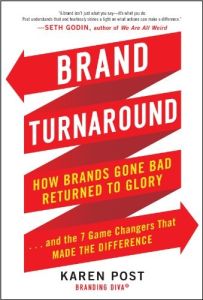
Brand Turnaround
How Brands Gone Bad Returned to Glory...and the 7 Game Changers That Made the Difference
Recommendation
With every scandal, a brand suffers consequences. From oil spills to celebrity meltdowns to product recalls, headlines that enthrall the public damage carefully constructed individual or corporate reputations. No person, product or service is immune. Consultant Karen Post explains that you need to prepare an action plan that includes seven strategic “game changers.” She skillfully repackages tried-and-true tactics to encompass social media techniques and crisis management, and the book is rich with branding war stories. Each chapter contains tales of marketing heroes who vanquished reputation-walloping crises. getAbstract finds that these war stories make enticing reading. Branding and advertising professionals, business leaders and entrepreneurs will benefit from Post’s user-friendly guide.
Summary
About the Author
Karen Post founded Brain Tattoo Branding consultancy. She also wrote Brain Tattoos: Creating Unique Brands That Stick in Your Customers’ Minds.











Comment on this summary